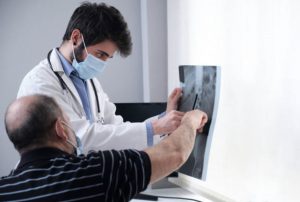Spondylosis
Spondylosis is a common, catch-all term that is often used to describe various types of spinal degeneration. Specifically, this condition can be used to explain the age-related degeneration of the anatomical elements in the neck or back. With that said, it is important to understand that spondylosis is not a clinical diagnosis, but rather a descriptive term. To identify the exact origin of your chronic neck pain, back pain, or other spine-related symptoms, it is essential that you visit a physician to determine what is causing your discomfort.
Causes
Spondylosis describes the gradual wear and tear of the spine over time. The most common occurrence of spondylosis is found in the lumbar (lower) region of the spine. The lumbar spine is responsible for supporting and stabilizing most of the body’s weight. As the body increases in weight and has years of bending and twisting, the components of the lumbar spine, such as the vertebrae, discs, and joints slowly start to deteriorate.
In some cases, spondylosis is a result of another spine condition, such as arthritis of the spine, causing the vertebrae or joint of the spine to deteriorate. Your doctor can accurately determine the cause of your spondylosis by reviewing your imaging tests.
When the components of the spine begin to degenerate, other spine conditions may occur. Common conditions associated with spondylosis include:
- Herniated disc
- Spinal stenosis
- Bulging disc
- Bone spurs
- Spondylolisthesis
- Degenerative disc disease
Conservative Treatments Options
Many times, patients with spondylosis can find relief from conservative therapies and treatments. For the most part, unless the condition is too severe, doctors will begin treatment through these conservative treatment methods. Common treatments include:
- Pain medication
- Nonsteroidal anti-inflammatory drugs
- Hot and cold therapy
- Posture improvement
- Physical therapy
- Lifestyle changes
Symptoms
Most mild cases of spondylosis are asymptomatic. In fact, most people above the age of 70 have spondylosis without any knowledge of it. Since the most common cause of spondylosis is the natural aging process, most people never experience symptoms besides minor and infrequent aches and pains occasionally.
However, more progressive cases of spondylosis may result in back stiffness and pain. Some patients may experience pain when bending or twisting as well as radiating pain down the buttick and leg. If you are experiencing any of these symptoms, reach out to your doctor to discuss the conservative and surgical treatment options available to you.
Diagnosis
A spondylosis diagnosis should only be made by your primary care doctor or a qualified specialist. This condition requires a thorough diagnostic process to rule out other conditions with similar symptoms. If chronic neck or back pain is taking you away from the people you love, getting the treatment you need for a full, active life depends on a proper diagnosis. Having a better understanding of diagnostic procedures can help you to better participate in your treatment and get back to the life you’ve been missing.
The healthcare professional will begin with an overview of your medical history to learn if you or your family members have had neck or back problems in the past. Genetics are believed to play a role in the development of degenerative spinal conditions like spondylosis. Your physician will also want to know if you’ve had any other health conditions or previous surgeries.
The inflammation and stiffness associated with spondylosis can affect the normal, healthy movements of your neck or back, so testing your range of motion may also be a part of your evaluation. Your physician may also check the reflexes in your hands and feet as poor reflex responses may point to nerve compression or damage.
Surgical Treatment Options
If conservative treatment options are ineffective after several months, you may be a candidate for surgery. If your doctor suggests that you explore surgical procedures, there are many available, including minimally invasive operations.
Reach out to BEST Health System
If you have been diagnosed with spondylosis, you do not have to suffer in silence. Connect with our team at BEST and get started on your path to recovery.
Related Articles
Does Excess Body Weight Lead to Spondylosis?
Understanding Spondylosis One of the leading causes of spondylosis is carrying excessive body weight. When individuals are obese, or even a few pounds overweight, it […]
What Causes Spondylosis?
Diagnosing Spondylosis Spondylosis is a medical term used to describe any disease of the spine that is degenerative. Due to the broad nature of spondylosis, […]
Spondylosis - How To Manage Symptoms
What is Spondylosis The symptoms of an aging spine, also known as spondylosis, do not always occur with other spine conditions. As a person gets […]
Spondylosis - An Overview
What is Spondylosis Spondylosis is a general medical term that is used to describe various forms of spinal degeneration that accompany the natural aging process. […]
Spondylitis - An Overview
What is Spondylitis Spondylitis is a spine condition that causes inflammation in the spine, specifically in the vertebrae and the spinal joints. If the condition […]




